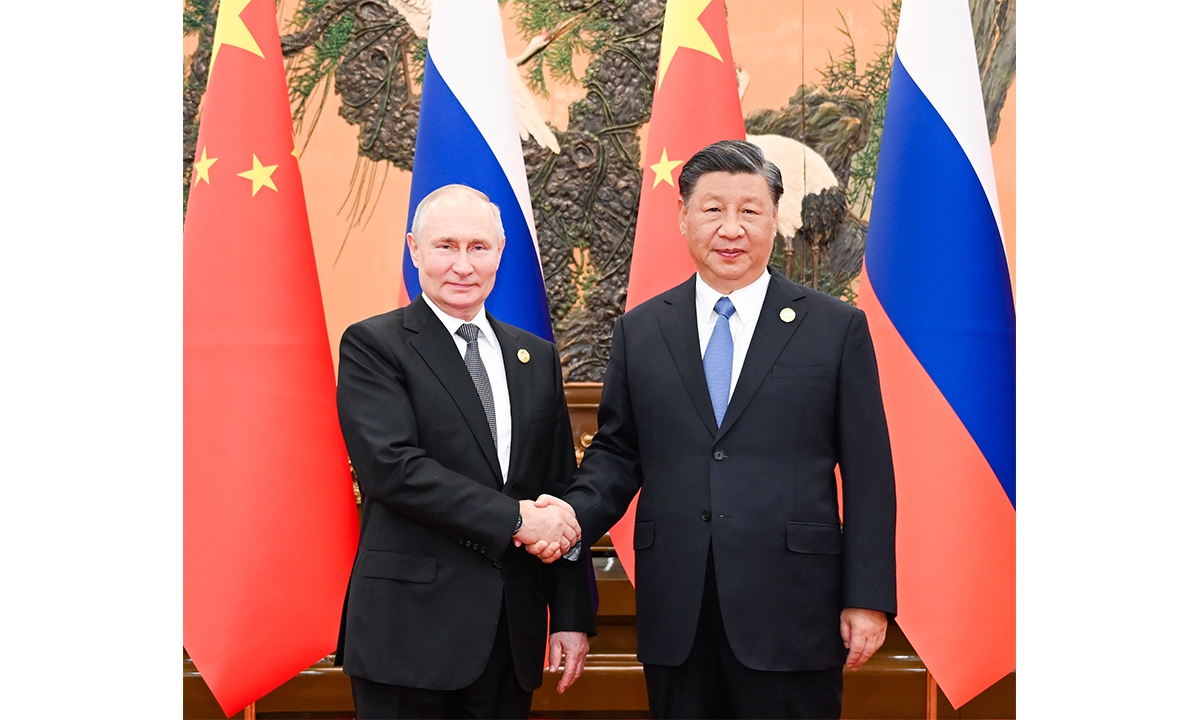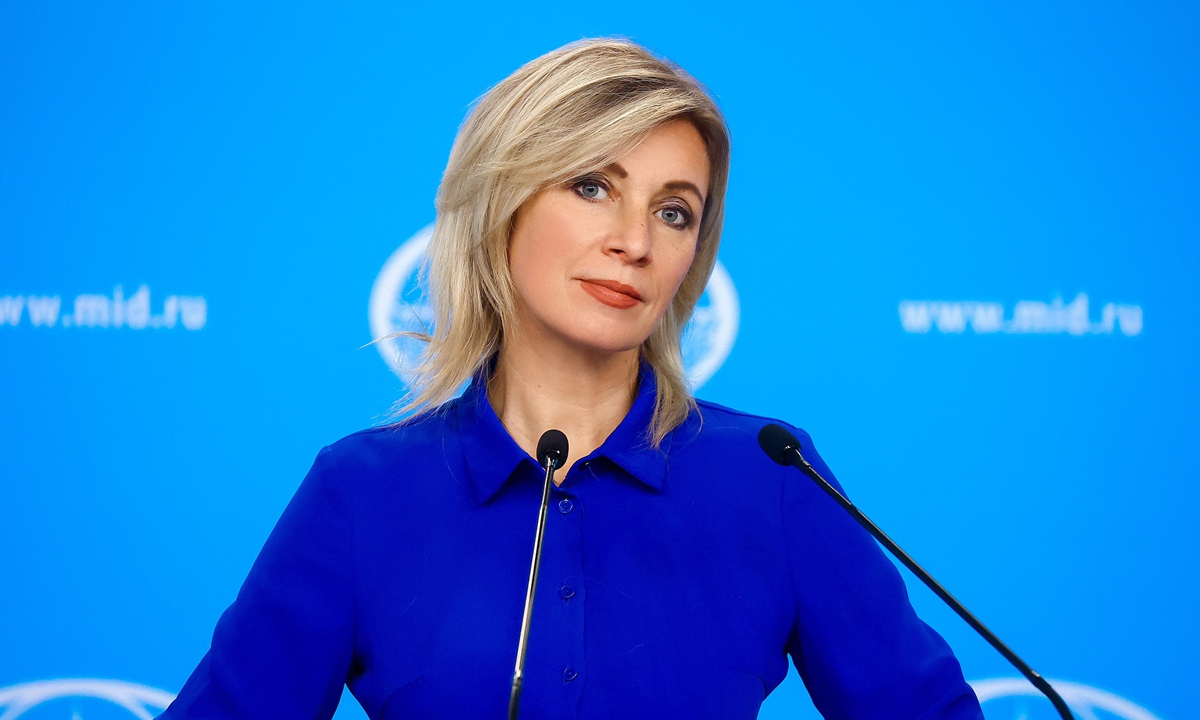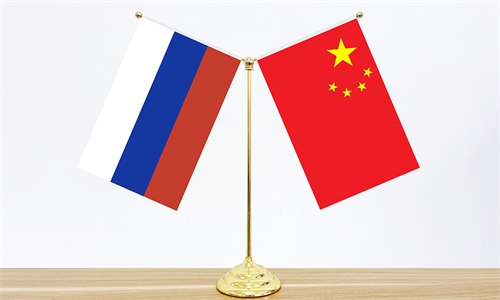Attempt by Western ill-wishers to introduce discord into China-Russia cooperation is doomed to fail: Russian FM spokesperson Zakharova

Chinese President Xi Jinping holds talks with Russian President Vladimir Putin at the Great Hall of the People in Beijing, China on October 18, 2023. Putin is in Beijing for the third Belt and Road Forum for International Cooperation. Photo: Xinhua
Editor's Note:Russian President Vladimir Putin visited China and attended the third Belt and Road Forum for International Cooperation in Beijing this week, highlighting Russia's strong support for the Belt and Road Initiative (BRI) and the deepening of China-Russia relations. In an exclusive interview with the Global Times (GT), Russian Foreign Ministry spokeswoman Maria Zakharova talked about how the BRI could boost regional development, the significance of Putin's China visit and the role of China and Russia in a multipolar world.
GT: This year marks the 10th anniversary of the BRI proposed by Chinese President Xi Jinping. What do you think about this initiative? What kind of changes has it brought to China-Russia relations and regional development?
Zakharova: We note the importance of the BRI put forward by the President of China Xi Jinping 10 years ago in terms of promoting regional integration and creating opportunities for mutually beneficial cooperation. This is a large-scale project that involves a variety of areas.
Russia is cooperating with the Chinese side on pairing the Eurasian Economic Union (EAEU) development and the BRI. We view this important integration project as the backbone and key element in building a broad unifying framework for the Greater Eurasian Partnership. We are convinced that practical implementation of the relevant arrangements between the leaders of our countries will contribute to comprehensive and sustainable development in the Eurasian space and facilitate closer cooperation in all areas.
The roadmap of trade and economic cooperation between the EAEU and China adopted by the Joint Commission on the implementation of the relevant Agreement between the EAEU Member States and the PRC at its third meeting this February provides a good basis for the process of pairing the development of joint industrial integration projects.
Work in this area becomes even more important in the context of the participation of the President of the Russian Federation in the third Belt and Road Forum for International Cooperation in Beijing.
GT: What is the significance of Putin's visit for the consolidation and deepening of the China-Russia comprehensive strategic partnership of coordination for a new era?
Zakharova: Developing relations of comprehensive interaction and strategic partnership with China is our absolute priority. I believe there is no need to further explain the importance of this track of Russia's foreign policy. The key guiding force behind bilateral ties is the diplomacy of the leaders.
President of the Russian Federation Vladimir V. Putin and President of the People's Republic of China Xi Jinping pay high personal attention to the continuous progress of bilateral interaction, which is truly comprehensive. Any contact between the heads of state is an opportunity to substantively coordinate positions, analyze the implementation of previous agreements, and approve new large-scale cooperation projects. Such meetings have never been of a formal nature; they are increasingly important in the context of the rapidly changing geopolitical situation and contribute to qualitatively strengthening ties between our countries.
The state visit of Chinese President Xi Jinping to Russia this March gave a powerful impetus to bilateral comprehensive cooperation. A visit to our country as his first foreign trip after his re-election as head of state was a clear sign of the unprecedented level of bilateral relations and Beijing's strategic choice in favor of further strengthening ties with Moscow.
The President of Russia, at the invitation of the President of the People's Republic of China, visits Beijing to participate as the main guest in the third Belt and Road Forum for International Cooperation. I would like to recall that the President of Russia previously attended the first two such summits - in 2017 and 2019. Traditionally, a representative Russian delegation is planned to attend the Forum.
This underscores the great importance we attach to the development of the integration processes in the Eurasian area. We are carrying out large-scale work with our Chinese partners to combine development potentials of the EAEU and the BRI with a view to achieve Greater Eurasian Partnership.
I am sure that the visit will become the central event of bilateral relations in the current time of the year.

Russian Foreign Ministry spokeswoman Maria Zakharova Photo: Courtesy of the Russian Foreign Ministry
GT: From the BRICS Summit, the G20 and the Belt and Road Forum for International Cooperation, developing countries are shining much brighter on the international stage this year. How do you see the future of multipolarization? What role can and should China and Russia play in a multipolar world?Zakharova: Many of the current events clearly show that the unipolar world order is indeed being replaced by a multipolar one. This is the main long-term trend in contemporary international relations.
This is evidenced, as you have rightly noted, by the success of the BRICS and G20 summits. But not only that. New centers of economic growth and political influence are emerging in all regions of the world. Interestingly, they, by and large, coincide with states-civilizations, civilizational communities and regional leaders. Among them are China, India, Brazil, several Arab states, Türkiye, Indonesia and some other ASEAN countries. In Africa, we can see new leaders who want to use the resources of the continent for its own benefit rather than serving the interests of former colonizers. This is shown in the statistical data.
More and more countries are turning toward promoting a more equitable world order based on the sovereign equality of states and the balance of their interests, a world order without a single hegemon or models of development and international cooperation that are being imposed by such. This means additional opportunities for gaining true sovereignty and freedom and implementing the right to independent and harmonious development.
Such a process is natural and irreversible, although it will take a long time, perhaps a whole historical epoch.
Many obstacles will have to be overcome on the way to a multipolar world. The collective West considers that the new world order is disadvantageous. Europe and the US want to preserve the status quo and frankly dread the prospect of losing the opportunity to parasitize on the rest of the world. The question is whether the Westerners would be able to continue to appropriate other countries' resources, pursue the dollar monopoly and impose their standards and rules under the guise of universal ones in the face of the emergence of several independent centers? It is no wonder that Western countries by all means are seeking to maintain their elusive dominance.
Western countries have brought confrontation to literally all spheres of interstate communication. As a field of the heated confrontation they have chosen Ukraine. And here, too, they have played the wrong card. The countries of the world's majority have seen the true face of the West in its fierce reaction to our refusal to submit to its hegemony.
In fact, the US and its vassals by their aggressive and reckless actions have created serious incentives for reshaping, in particular, the global financial and economic architecture. We are witnessing increased cooperation among countries that are facing external pressure. Regional and transregional mechanisms of economic interaction and integration are being formed, and multi-format partnerships are being created to address specific common development challenges. Among the promising new-type structures are the EAEU, the SCO and the already mentioned BRICS association: there is literally a list of those wishing to join it. This further confirms our assessment regarding the aspirations of many countries and peoples of the world not to be guided by the neocolonial West-centered order, but rather fight for their right to independently choose their development path.
Russia in this context acts as one of the world's sovereign centers and fulfils its historical and unique mission to maintain the global balance of power and ensure conditions for a peaceful and progressive development of mankind based on a unifying and constructive agenda.
GT: Since the beginning of the Russia-Ukraine conflict, the US and many other countries in the West have imposed comprehensive sanctions on Russia. Is there a difference in the attitude of the US and Europe toward Russia? How will these sanctions end?
Zakharova: The purpose of illegitimate restrictions on the part of the US and other countries in the West was declared to be the desire to force our country to change its independent political course, to oust Russia from global energy markets, to undermine its competitiveness and prospects for a long-term development, to inflict the maximum damage on its national interests with a prospect of destabilizing the internal political situation. This, as we know, did not happen. However, the anti-Russia restrictive measures continue to play a significant role in the foreign policy of the US and its satellites. Moreover, the list of sanctions in the economic and financial spheres specifically continues to grow.
It is obvious that the US, which initiated this illegal sanctions policy against our country, is its main beneficiary. This is not the case for Europe which now buys certain raw materials from Americans at a much higher price than it could if it were guided by the interests of its own citizens, and not by political dictates of Washington. The reverse damage to the countries of the European Union, their citizens and businesses from the sanctions policy against Russia is recognized already in the West not only by experts but also at the official level. The breaking of trade and economic ties, the flight of foreign business from our market and its billions of dollars in investment losses, the surge in consumer prices and the rise in the cost of living are most painfully manifested in Europe.
It is noteworthy against this backdrop that the US continues to maintain trade ties with Russia in several directions. As it follows from the latest Forbes rating, the generality of 50 major foreign companies carrying on their businesses in Russia is American. So much for the differences in the approaches of the US and the EU to the issue of restrictions against our country!
We are convinced that the sanctions war with Russia is not going to end in anything good for its initiators. The accumulated economic problems in the US and EU, including due to the large-scale ill-conceived measures of financial support of the population and business during the COVID-19 pandemic multiplied by the attempts of the Western leaders to preserve at any cost their financial and economic dominance in the world will have a long-term negative impact on these states.
Regarding our country, as President Vladimir Putin noted, Russia has withstood the unprecedented "sanctions onslaught" of the unfriendly countries and, in general, has completed the process of economic recovery. By the projections of the Government of the Russian Federation, the country's annual GDP growth will be more than two percent in the next three years. We shall continue to actively work in progress to strengthen our own economy, including by building mutually beneficial foreign economic relations with reliable partners who adhere to a constructive line in relations with our country.
GT: Despite the steady development of China-Russia relations, the US and some countries in the West constantly smear the China-Russia comprehensive strategic partnership. What is your take on this?
Zakharova: The Russia-China relations of comprehensive strategic partnership and strategic interaction are indeed targeted by criticism and biased negative assessments from our common ill-wishers; we are faced with their attempts at all costs to introduce discord into the Moscow-Beijing cooperation, to restrain the development of our countries one at a time. We can confidently state that such tactics are doomed.
Strong interstate ties between Russia and China have a long history and have successfully withstood the test of time, and today our ties are also overcoming the challenges related to the pandemic, the unstable international situation, and the systematic attempts by Westerners to organize large-scale sanctions pressure. In the modern international environment, characterized by an imbalance of interests and an explosive growth of conflict potential, our countries remain committed to the principles of mutual respect, non-interference in each other's internal affairs, and mutual support on issues affecting key national interests.
The obvious achievements of bilateral cooperation that have been developing for the benefit of our peoples prove that the path we have chosen is the right one and that the policies of Western countries to maintain their hegemony by destabilizing Russia and China are bound to fail.
Russia and China closely coordinate their efforts on the world stage, based on the high consonance of their positions on major international issues. The sovereign foreign policy course we have taken, our willingness to protect the goals and principles of the UN Charter and uphold the supremacy of international law, get a lively response from the majority of countries. Moscow and Beijing continue to closely coordinate foreign policy efforts in the interests of a more just and democratic world order that is based on cultural and civilizational diversity and validated balance of interests of the members of the world community.
Those from the Western countries who throw in allegories like "marriage of convenience" in relation to Russia-China interaction would be advised to take a closer look at the system of relations in their camp and honestly admit what is more prevailing there - sincere respect and consideration of each other's positions or cheating and abuse. The NATO family, where only the US has the right to vote, is more like a sect rather than a union of equals.
In our view, the relations between Russia and China are a paragon of interstate cooperation between major powers in the 21st century.



